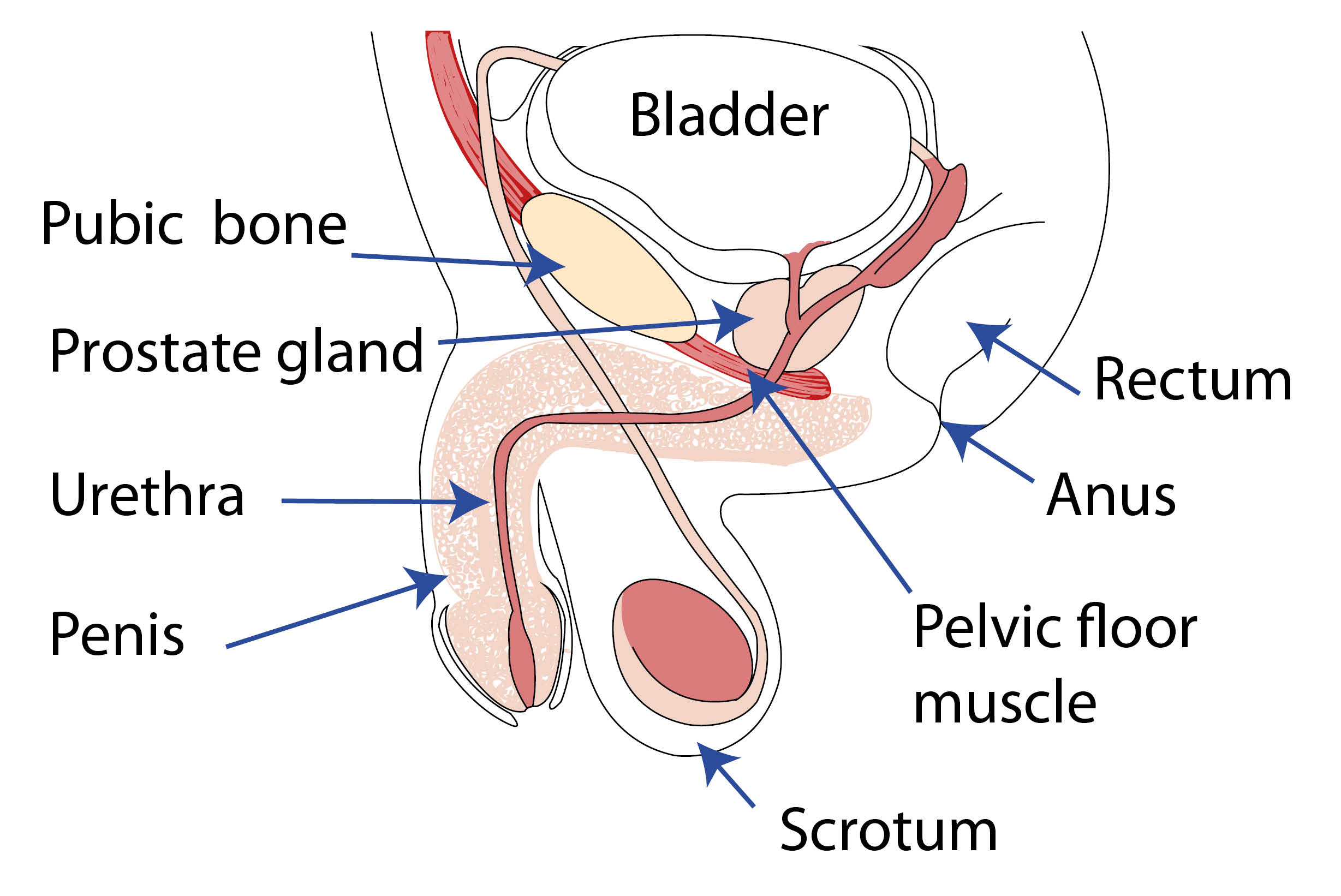Pelvic floor exercises for men undergoing radical prostatectomy
Information for patients from the Urology Department
You have been given this leaflet to help you with the recovery of continence following robotic surgery for prostate cancer.
What are pelvic floor muscles?
The pelvic floor muscles help to maintain urinary and bowel continence by supporting the organs of the pelvis and maintaining their position. The muscles run between the pubic bone (at the front of the bladder) and the base of the spine at the tail bone.

Pelvic floor exercises are designed to train the muscles that are important for continence, support, and sexual activity.
Pelvic floor exercises will also promote increased blood flow to the pelvic area, helping to maintain healthy tissues and preserve normal function.
Why do I need to exercise my pelvic floor muscles?
Exercising your pelvic floor muscles can minimise both urinary incontinence and impotence after your prostate surgery.
The surgery can cause a degree of damage to the valve that keeps you continent and dry. Following your operation you will have a catheter in place for around seven to 14 days, depending on the type of prostatectomy you have had. When it is removed there may still be some inflammation (swelling) of the tissues. As a result you may have some incontinence of urine.
What should I eat and drink after surgery?
Your nurse will discuss your fluid intake with you, including the amount you should drink and which fluids. For example, it may help if you avoid or reduce caffeine (tea, coffee, cola) and fizzy drinks.
Eat a healthy balanced diet to help reduce or maintain your weight. Excess pounds put undue pressure or ‘stress’ on your bladder.
Pelvic floor exercises
Please practice these exercises (numbered 1 to 3) every day.
One set in the morning.
One set in the afternoon and evening.
10 contractions per session.
Do not do all the exercises in the same position.
Lying down
Lie on your back with your knees bent, and your feet comfortably apart on the bed.
Tighten (contract) your pelvic floor as if you are trying to stop wind escaping.
Hold the pelvic floor contraction as strongly as you can. Try to hold for three to five seconds, increasing the time gradually as your strength and stamina improves; aim to hold for 10seconds.
Avoid holding your breath, pulling in your stomach, or clenching your buttocks.
Sitting
Sit on a chair with your knees apart.
Tighten (contract) your pelvic floor as if you are trying to stop wind escaping.
Hold the pelvic floor contraction as strongly as you can. Try to hold for three to five seconds, increasing the time gradually as your strength and stamina improves; aim to hold for 10seconds.
Avoid holding your breath, pulling in your stomach, or clenching your buttocks.
Standing
Stand with your feet apart.
Tighten (contract) your pelvic floor as if you are trying to stop wind escaping.
You should see the base of your penis move in and your testicles lift.
Hold the pelvic floor contraction as strongly as you can. Try to hold for three to five seconds, increasing the time gradually as your strength and stamina improves; aim to hold for 10seconds.
Avoid holding your breath, pulling in your stomach, or clenching your buttocks.
Exercising your pelvic floor muscles during other activities
While walking tighten your pelvic floor a little.
After passing urine tighten your pelvic floor as strongly as you can. This will help to squeeze the last few drops of urine from your urethra (water pipe) before you leave the toilet.
During sexual activity tighten your pelvic floor to help keep your penis firm.
Important tip
Tighten your pelvic floor quickly just before and during activities such as:
standing from a sitting position
coughing
sneezing
laughing
shouting
lifting
bending; or stretching.
Do these exercises regularly to strengthen your pelvic floor muscles and keep them toned.
What if I have a sudden urge to urinate?
Some men may have a sudden strong need to pass urine; a urine leak may happen directly after this. The best way to overcome this urge is to:
Stay calm (panic makes things worse).
Sit down or stand still for 30 to 60 seconds until the urge disappears.
Try to think of something else to take your mind off of the sudden need to pass urine.
Do not make a sudden lunge or rush for the toilet.
Continue normal activity or visit the toilet once the urge has passed.
This technique helps to challenge your bladder to hold more urine.
What if I develop an infection?
An infection can sometimes make your bladder problems worse. If you have any of the following symptoms contact your GP or specialist nurse.
Pain or burning whilst passing urine.
Fever or chills.
Dark, cloudy, or offensive smelling urine.
Passing small, frequent amounts of urine.
Useful numbers
Prostate Specialist Nurses
Kent and Canterbury Hospital
Ethelbert Road
Canterbury, Kent CT1 3NG
Telephone: 01227 868666Kent Continence Service
Ground floor, Exchange House
Thomas Way
Hersden, Kent CT3 4NH
Telephone: 03007 900310